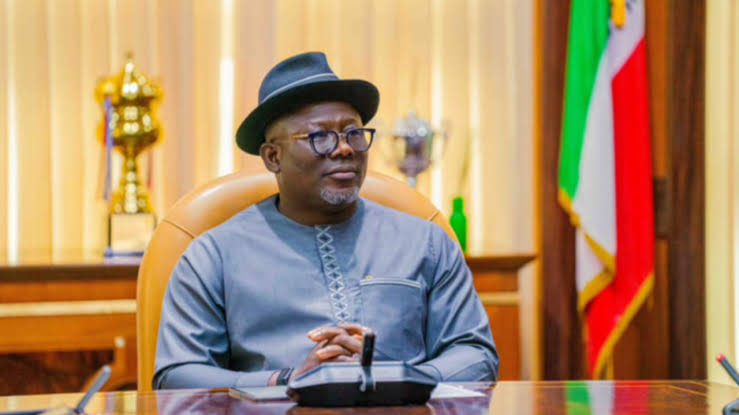POLITICAL EARTHQUAKE IN DELTA: OBOREVWORI.OKOWA SHIFT ALLEGIANCE TO APC, STIRRING 2027 AMBITIONS...
Published on 26 April 2025
The political landscape of Delta State, Nigeria’s oil-rich hub, has been thrown into turmoil following the defection of Governor Sheriff Oborevwori, his predecessor Senator Ifeanyi Okowa, and a wave of PDP stalwarts to the ruling All Progressives Congress (APC). This seismic shift, unfolding just days ago, signals fierce battles ahead as the APC gears up to consolidate power in a region long dominated by the PDP since 1999.

A PDP Exodus Shakes the State
The move, described by insiders as a calculated survival strategy, saw Oborevwori and Okowa dismantle the PDP’s state machinery, directing supporters to dissolve into the APC. The formal declaration, set for April 28 in Asaba, will be graced by Vice President Kashim Shettima, underscoring the APC’s national interest in reclaiming Delta. Governor Oborevwori, exuding confidence, hinted at the inevitability of the defection, stating, “Our people have chosen to align with progress,” while Okowa’s exit marks a dramatic turn for the 2023 PDP vice presidential candidate.
2027 Calculations and National Repercussions
Sources close to the defectors reveal the decision stems from the PDP’s weakening national foothold and President Bola Tinubu’s rising influence. With the PDP reduced to 11 states and internal strife fueled by Atiku Abubakar’s persistent presidential ambitions, Delta’s leaders see the APC as a safer bet for 2027. Senator James Manager, a PDP pioneer, lamented the party’s decline: “Why remain in a sinking ship? The PDP’s resolution against coalitions sealed its fate.”
Clash of Titans: Oborevwori vs. Omo-Agege
A looming power struggle within Delta’s APC centers on Governor Oborevwori and Senator Ovie Omo-Agege, the party’s former gubernatorial candidate and current leader. By convention, Oborevwori’s incumbency grants him APC leadership, but Omo-Agege, who previously dismissed the governor’s entry, faces a dilemma. Their rivalry echoes broader tensions: Will Tinubu’s intervention mediate, or will Omo-Agege exit, as rumors suggest?
Ibori’s Shadow and Unresolved Grudges
Complicating matters is Chief James Ibori, Delta’s political godfather, whose influence spans both PDP and APC. Though yet to formally join the APC, his loyalists—including Senator Peter Nwaoboshi—dominate the party. Okowa’s fallout with Ibori over Oborevwori’s 2023 nomination remains a thorn, with some APC members vowing to block Okowa’s integration. Meanwhile, Oborevwori treads carefully, balancing respect for Ibori with loyalty to Okowa.
Nwoko’s U-Turn and Internal Dissent
Senator Ned Nwoko, once a vocal critic of Oborevwori, has softened his stance, though his silence on Okowa speaks volumes. His earlier outbursts—“Oborevwori lacks capacity”—contrast with recent pragmatism, highlighting the APC’s internal fractures. Meanwhile, APC Chairman Felix Morka’s welcoming statement clashes with grassroots skepticism, as longtime members fear being sidelined by PDP defectors.
Tinubu’s Gambit and the Road Ahead.
President Tinubu’s “Renewed Hope” agenda appears to be reaping dividends, with Aviation Minister Festus Keyamo hailing the defection as transformative. Yet, Delta’s political future hinges on delicate negotiations: Can Oborevwori secure the 2027 APC ticket, or will Omo-Agege’s ambitions reignite? With Ibori’s kingmaker role and Tinubu’s backing, the APC’s unity—or lack thereof—will determine if Delta turns from PDP’s “corrupt 25-year rule” to a model APC stronghold.
As the Cenotaph declaration approaches, Delta’s political theater promises high-stakes drama, with 2027’s shadow looming large. The PDP’s collapse may be APC’s gain, but only if its factions can navigate the treacherous waters of allegiance, ambition, and legacy.


